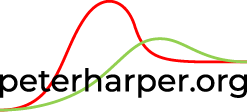GMOs
GMO stands for genetically-modified organism. This is another topic of polarised debate in which people rarely change sides.
Of course there are proselytising partisans, but on the 'pro' side most people are passive accepters. Most of the strength of feeling is on the 'anti' side. Its spring seems to be a quasi-phobic revulsion against what is seen as 'un-natural'. Many people would feel 'contaminated' if they knowingly consumed transgenic foods. Once having established that GMOs are in some sense 'evil' the mind will naturally cherry-pick evidence to support this view, and to some extent the opposite also true.
In the early days I simply observed and did not take a view. I noticed that several different sorts of arguments were being used. I was sorry to see that experimental trials to test some of the claims and counter-claims were the subject of direct action protests. Presumably the aim here was to prevent development of GMOs through some form of the Precautionary Principle: that if you don't know, you shouldn't go there; and we would simply never know.
It seems to me that it is rather too late to 'un-know' what we do now know. Many recent developments in biology and genetics have shown how extraordinary plastic the genome is; how there is a great deal of 'lateral transfer' of genetic material; that 'alien genes' can be attached to the human and other genomes by viruses; and that we share all manner of quaint and curious genes with very distantly-related species.
As far as food is concerned, enough countries have grown GMO crops for long enough on a mass scale without any obvious disasters, to feel confident that the most extreme fears are unfounded. The threat of 'super-weeds' has not materialised. There have been no reported illnesses.
Much has been made of the commercial drivers and spectre of wicked capitalists profiting from the misery of others. But there does not appear to have been a great deal of misery, except (in some cases) the inability to save seed. This struck me as an odd argument: farmers are under no obligation to use GM varieties if they wish to save their own seed. But most modern farmers don't do this any more anyway. The 'wicked capitalist' argument is much weaker in the context of medical applications, and is usually given a free pass as being 'humanitarian'. This however has brought an acceptance that GM technology is not wrong in principle, just in practice, with respect to agricultural commodities.
Within the field of plant breeding, single targeted gene techniques have enormously increased the precision of work, and therefore speeded up the generation of new varieties. There is no remote possibility that research workers will stop using such techniques.
In short, I think the opposition argument is being lost, and the technology as a whole has established that it is relatively safe and too useful to be lightly abandoned.
Is it the case then that 'only GM can feed the world', as some have claimed? No, not at all: there is actually plenty of food, but it is poorly grown, poorly distributed, and misused in feeding livestock. New varieties will doubtless be valuable, and GM techniques might well play a part in developing them. But we don't actually depend on it, nor strictly need it at all. While it would be as well to keep an eye on it, in case serious unforeeseen effects do emerge, I'd say that it has now slipped below the level of things to campaign against, or even to lose any sleep over.

